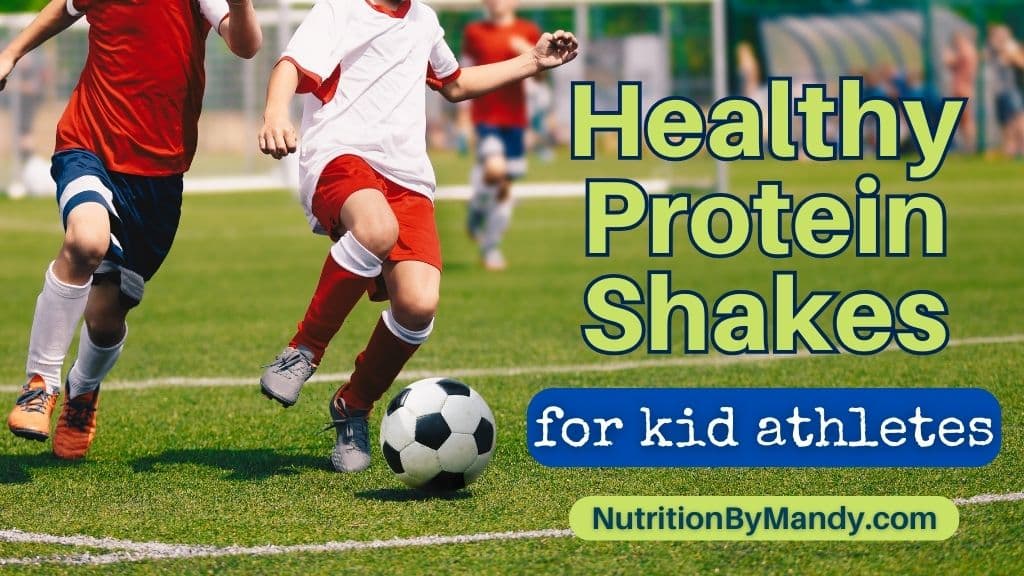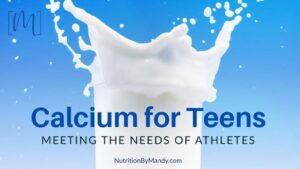Last Updated on September 22, 2023 by Mandy Tyler, M.Ed., RD, CSSD, LD
Healthy Protein Shakes for Kid Athletes
A question I commonly receive from parents is whether or not protein shakes are necessary for kid athletes.
Let’s take a look at the protein needs of youth athletes. Then we will examine the potential uses of protein shakes for kid athletes as well as healthy protein shake options.
Importance of Protein in the Diet of Kid Athletes
Protein is important in the diet of children and adolescent athletes. It has many essential roles in the body, including supporting the growth and maintenance of lean muscle mass.
Protein Needs of Kid Athletes
There is limited research available on the protein needs of youth athletes. However, to support a child athlete’s growth and development as well as physical activity, it appears protein needs are greater than the currently recommended Dietary Reference Intakes (1).
General recommendations are for child and adolescent athletes to consume ~ 0.3 grams of protein/kg body weight with each meal or snack spread throughout the day. If the youth athlete consumes three meals and two snacks during the day, the daily protein intake would be in the range of 1.5 g/kg/day (1, 2, 3).
For child athletes, ~0.3 grams/kg body weight calculates to be in the range of ~10-15 grams of protein at each meal and snack (depending on body weight). Based on a large body size, adolescent athletes generally need ~15-25 grams at each eating occasion to support their protein needs.
Therefore, when preparing or purchasing protein shakes for kid athletes, aiming for ~10-15 grams of protein in the shake would be appropriate.

Do Kid Athletes Need to Drink Protein Shakes?
While it is important for kid athletes to consume adequate protein in their overall diet, it does not have to come in the form of a protein shake. A protein shake may be a convenient way to add protein to your child’s diet when time is limited.
In addition, protein shakes may be beneficial for youth athletes who are picky eaters and struggle to consume adequate protein in their diet. They also can be convenient when traveling and you want to have a quick option available following a game.
It is important to remember that protein shakes should supplement an athlete’s meal plan, not take the place of whole foods in the diet of youth athletes.
Drinks for Kid Athletes Containing Protein
Before discussing protein shakes, let’s review several drink options that kid athletes can enjoy that provide protein.
Low-Fat Milk
A cup of low-fat (1%) milk provides 8 grams of protein (4). Milk is a source of high-quality, complete protein. A complete protein provides all of the essential amino acids that our bodies cannot produce. The body can efficiently utilize high-quality, complete proteins to build muscle in the body (5).
Including protein, milk provides 13 essential nutrients that are important for an athlete’s health. Encouraging kid athletes to drink low-fat milk is an easy way to boost the protein content of their diet.

High-Protein, Ultra-Filtered Milk
Ultra-filtered, high-protein milks are another simple option for boosting the protein intake of a kid athlete. Ultra-filtered milks, such as Fairlife® or H-E-B MooTopia, are high-protein milk options athletes can try. These milks are filtered to remove the lactose and contain a concentrated protein and calcium content.
To provide a comparison, a cup of ultra-filtered milk has ~13 grams of protein (6), while a cup of regular cow’s milk has 8 grams of protein. As an added bonus the ultra-filtered milk is lactose free making it a great option for kids who are sensitive to lactose.
High-Protein Plant-Based Milks
In general, plant-based milks (almond, coconut, oat) tend to be low in protein. For example, a one-cup serving of unsweetened almond milk contains ~1 gram of protein (7). An exception to this is soy milk, which contains ~6 grams of soy protein per cup (8).
Some brands of plant-based milks are starting to offer higher protein varieties, two examples are listed below.
- Silk® Original Protein: Almond and cashew blend that contains added pea protein. A one cup serving provides 10 grams of protein, along with calcium and Vitamin D.
- Orgain® Organic ProteinTM Almond Milk: Unsweetened almond milk that contains added pea protein. A one cup serving provides 10 grams of protein as well as calcium and Vitamin D.
Greek Yogurt Drinks and Smoothies
In addition to milk, Greek yogurt drinks and smoothies can be a great protein option for kids. Although not marketed as protein shakes, those containing ~10 grams of protein can support kid athletes with meeting their protein needs.
Chobani® and Stonyfield® both offer Greek yogurt drinks and smoothies that are packaged in individual serving-size bottles that are easy to drink from. Thus, they are a great portable drink option that kid athletes can enjoy on-the-go
- Chobani® Greek Yogurt Drinks: Provide 10 grams of protein per 7 fl oz, as well as calcium and probiotics. This blended Greek yogurt drink comes in a variety of flavors.
- Stonyfield® Organic Probiotic Low-Fat Yogurt Smoothie: Provides 10 grams of protein per 10 fl oz. Also provides calcium, Vitamin D, as well as probiotics to promote gut health.
Preparing Protein Shakes for Kid Athletes
If you would like to prepare a protein shake for your kid athlete, there are numerous ways you can add protein to the shake without using a protein powder. When preparing a protein shake with real food and beverages you get the added benefit of vitamins, minerals, and phytochemicals that those items contain.
The following ingredients can be used in a protein shake or smoothie for kid athletes.
- Low-fat milk: 8 grams of protein in 1 cup (4)
- Ultra-filtered, high-protein milk: 13 grams of protein in 1 cup (6)
- Dry milk: 8 grams of protein in 1/3 cup (9)
- Soy milk: 6 grams of protein in 1 cup (8)
- Greek yogurt: ~23 grams of protein in 1 cup (227 grams) (10)
- Cottage cheese: 28 grams of protein in 1 cup (11)
- Nut butter: ~7 grams of protein in 2 Tbsp (12)
- Silken tofu: ~6 grams of protein in 3-oz (13)
In addition to protein, blend in a variety of frozen fruits, sliced banana, and leafy greens to create a nutrient dense protein shake kid athletes will enjoy.

What About Using Protein Powders in Protein Shakes for Kid Athletes?
Given the relatively low amount of protein needed by kid athletes at meals and snacks, protein needs can easily be met with real food and beverages.
However, when time is limited, when traveling, or for kid athletes who are picky eaters, protein powders may come in handy.
Evaluating Protein Powders for Kid Athletes
When selecting a protein powder, it is important to recognize that supplements are not regulated by the Food and Drug Administration in the same way that food is. Dietary supplements may be contaminated with substances not listed on the label, which could potentially be harmful to an individual’s health (14).
Due to this, look for supplements that have been third-party tested. Supplements that are third-party tested have an outside organization evaluate the supplement for accuracy of ingredients. Two companies that evaluate sports supplements are NSF International Certified for Sport and Informed Sport.
If you are considering the use of a protein powder for your kid athlete, it is always best to visit with a sports dietitian nutritionist. The sports dietitian nutritionist can work with you on developing a meal plan for your child. In addition, the sports dietitian nutrition can elp evaluate the safety of protein powders you are considering.

Amount of Protein in One Serving
When using protein powder in a shake, be aware of how much protein is in one scoop of the protein powder. Recognizing that a kid athlete only needs 10-15 grams of protein in the shake, you may not need to include one full scoop of the protein powder.
If you are mixing the protein powder into milk or adding in other sources of protein such as Greek yogurt or nut butter, make sure to factor in the protein content of these items when calculating the total protein in the shake.
Added Ingredients
Finally, make sure to review the label to see if the protein powder contains any other added ingredients aside from the source of protein. Many protein powders contain a variety of added ingredients, which are not necessary for kid athletes.
When selecting a protein powder, look for one with limited added ingredients aside from the source of protein. You can easily blend the powder with frozen fruits, leafy greens, nut butters, and other food ingredients to increase the carbohydrate, vitamin, and mineral content of the protein shake.
Healthy Protein Shakes for Kid Athletes
You are now set with a variety of ideas for how you can add protein to your kid athlete’s meal plan. As a reminder, protein shakes should not take the place of real food in your child’s diet.
Including a variety of protein-rich foods and beverages in your athlete’s sports nutrition meal plan will provide them with the nutrients they need to grow, develop, and perform at their best.
For additional sports nutrition tips for kid athletes, check out my blog: Nutrition Tips for Afterschool Sports.
Join the Nutrition By Mandy Email List & Get a Free Athlete’s Grocery List
Click HERE to join the Nutrition By Mandy e-mail list. When you join you will receive a free athlete’s grocery list to print and take with you to the store.
About the Author
Mandy is a Sports Dietitian Nutritionist in the San Antonio, TX area. She is a Registered and Licensed Dietitian, a Board-Certified Specialist in Sports Dietetics, a Licensed Athletic Trainer, and is a Certified Exercise Physiologist through the American College of Sports Medicine. Mandy has experience working with athletes at the high school, collegiate, and professional levels. She believes the key to reaching one’s full potential, both in everyday life and in sports performance, relies on a healthy nutritional foundation. Learn more about the work Mandy does here.





